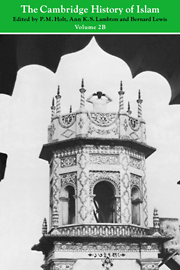Book contents
- Frontmatter
- Introduction
- PART VIII ISLAMIC SOCIETY AND CIVILIZATION
- 1 THE GEOGRAPHICAL SETTING
- 2 THE SOURCES OF ISLAMIC CIVILIZATION
- 3 ECONOMY, SOCIETY, INSTITUTIONS
- 4 LAW AND JUSTICE
- 5 RELIGION AND CULTURE
- 6 MYSTICISM
- 7 REVIVAL AND REFORM IN ISLAM
- 8 LITERATURE
- 9 ART AND ARCHITECTURE
- 10 SCIENCE
- 11 PHILOSOPHY
- 12 WARFARE
- 13 THE TRANSMISSION OF LEARNING AND LITERARY INFLUENCES TO WESTERN EUROPEo
- Dynastic List
- Bibliography
- Glossary
- Index
- References
7 - REVIVAL AND REFORM IN ISLAM
from PART VIII - ISLAMIC SOCIETY AND CIVILIZATION
Published online by Cambridge University Press: 28 March 2008
- Frontmatter
- Introduction
- PART VIII ISLAMIC SOCIETY AND CIVILIZATION
- 1 THE GEOGRAPHICAL SETTING
- 2 THE SOURCES OF ISLAMIC CIVILIZATION
- 3 ECONOMY, SOCIETY, INSTITUTIONS
- 4 LAW AND JUSTICE
- 5 RELIGION AND CULTURE
- 6 MYSTICISM
- 7 REVIVAL AND REFORM IN ISLAM
- 8 LITERATURE
- 9 ART AND ARCHITECTURE
- 10 SCIENCE
- 11 PHILOSOPHY
- 12 WARFARE
- 13 THE TRANSMISSION OF LEARNING AND LITERARY INFLUENCES TO WESTERN EUROPEo
- Dynastic List
- Bibliography
- Glossary
- Index
- References
Summary
THE TRADITION
The period in which formative developments took place in Islam, and at the end of which Muslim orthodoxy crystallized and emerged, roughly covered a period of two centuries and a half. Since this was the formative period, one cannot strictly speak of either revival or reform in Islam during this time, for both revival and reform can logically occur only after an orthodoxy has been established. Nevertheless, it would be a grave error to overlook the developments that occurred during this period since the very emergence of orthodoxy occurred only after long struggle and conflict in the fields of politics, moral ideas and spiritual motifs. Indeed the germs of all the subsequent major developments in Islam, involving moral and spiritual issues, are traceable to this very early period in the history of the Muslim community after the death of the Prophet. The issues as to whether the Muslims should have a state at all, and, if so, what would be its nature and structure; whether the community should be based on a catholic toleration or exclusivism; what type of economic principles should be generally regarded as Islamic; whether man is free and responsible, or whether his actions are pre-determined; whether the community should decide issues in a collective spirit through ijmā‘ or whether it should accept the principle of an infallible Imām—all these problems were in some form or another raised, and in some sort answered during the earliest generations of Islam.
- Type
- Chapter
- Information
- The Cambridge History of Islam , pp. 632 - 656Publisher: Cambridge University PressPrint publication year: 1977
References
- 3
- Cited by

